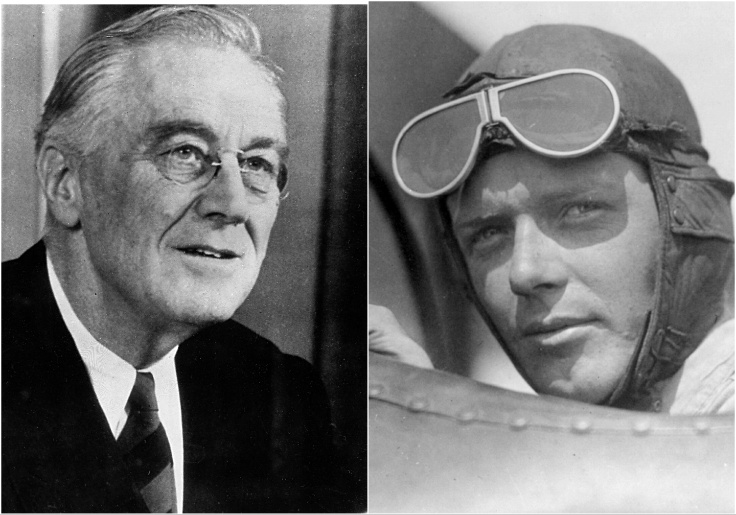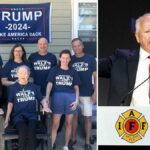When Lindbergh’s Dark Visions Took Flight

Abraham Lincoln had a ready rejoinder for wartime critics who accused him of shredding the Constitution. To the contrary, said Lincoln; confronted with domestic rebellion he was willing to temporarily suspend part of the nation’s organic law in order to preserve the entirety, and the nation with it. “Often a limb must be amputated to save a life,” he observed drolly, “but a life is never wisely given to save a limb.” Lincoln’s pithy logic recurred to me while reading America First, H.W. Brands’s timely reassessment of the fierce debates preceding Pearl Harbor and the United States’ formal entry into World War II.
Brands’s Franklin Roosevelt dominates his era as surely as Lincoln defined his. Lion and fox, he is equally prepared to cut corners and outwit or harass adversaries while defending democracy—as he defined it—from enemies foreign and domestic. “Roosevelt had a gift for orchestrating inevitability,” Brands asserts, in what might easily serve as an epigraph to this split screen history. The other half being occupied by famed aviator turned antiwar crusader Charles Lindbergh.
Many a historian has documented Roosevelt’s agility in steering his isolationist countrymen from legislated neutrality in 1937 to undeclared war in two oceans by the autumn of 1941. Brands himself traced the process in his acclaimed biography of FDR, Traitor to His Class, published in 2008. Here he heightens the drama by narrowing his focus. The resulting narrative, reductionist as a duel, pits a cunning president and political virtuoso against the credulous Lone Eagle, enshrined in popular memory for his pioneering New York to Paris flight in May 1927.
Son of an antiwar Republican congressman from Minnesota, Lindbergh was equal parts mechanic and mystic. Describing a solitary flight over the Rocky Mountains, threading the clouds “like a god,” he reflects, “I owned the world that hour as I rode over it, cutting through my sky, laughing proudly down on my mountains, so small, so beautiful, so formidable.” His moral imagination was earthbound by contrast, especially where racial or ethnic factors intruded. “I cannot help liking the Germans,” he observed on the eve of World War II. “They are like our own people. We should be working with them and not constantly crossing swords.”
Given free access to Nazi Germany’s rapidly expanding air force in the 1930s, Lindbergh became an evangelist for Berlin’s military superiority. Together with his wife, Anne, Lindbergh made plans to relocate to Hitler’s capital. Then came Kristallnacht, the November 1938 pogrom featuring coordinated attacks on Jewish-owned businesses, homes, and synagogues across Germany. In its aftermath Lindbergh was less outraged than puzzled. Acknowledging that the Third Reich had “a difficult Jewish problem,” he asked himself, “Why is it necessary to handle it so unreasonably?” The Berlin move was shelved.
Lindbergh and Roosevelt met but once, in April 1939. The charismatic pilot proved notably resistant to the president’s fabled charm. “There was something about him I did not trust,” Lindbergh wrote afterward, “something a little too suave, too pleasant, too easy.” Suspecting, correctly, that the administration hoped to muzzle him, Lindbergh turned down a White House offer to head a new cabinet-level department of aviation.
He was hardly more trusting of the press corps, understandably so given its invasive coverage of the 1932 kidnapping and murder of his infant son. Lindbergh nevertheless accepted an invitation, following Hitler’s invasion of Poland at the start of September 1939, to appear on all three radio networks—NBC, Columbia, and Mutual. Recalling the broken promises and dashed hopes of the First World War, he said it would be “madness” to spill fresh American blood over European quarrels. Fortunately, he told listeners, geography was their ally, as two vast oceans afforded Americans protection from even the latest model enemy bombers.
FDR was quick to respond. Appearing before a joint session of Congress six days after Lindbergh’s broadcast, the president asked lawmakers to amend the 1937 Neutrality Act that effectively prevented Europe’s embattled democracies from purchasing “defensive weapons”—strictly cash and carry—with which to resist the Nazi blitzkrieg. The debate was joined. A eugenicist whose preoccupation with selective breeding led him in later years to father seven children by three German mistresses, Lindbergh redefined the U.S. connection to Europe as “a bond of race and not of political ideology. … If the white race is ever seriously threatened,” he allowed in an October 13, 1939, radio address, “it may then be time for us to take our part in its protection.”
Until then Lindbergh refused to risk American lives for the British Empire or against Hitler’s expansionist claims. Exchanging the bully pulpit for the presidential classroom in June 1940, Roosevelt disputed the idea that Americans could safely inhabit “a lone island in a world dominated by the philosophy of force.” He blamed the airplane for rendering “so called impregnable fortifications” as obsolescent as France’s easily bypassed Maginot Line. He also challenged American industry to produce an astonishing 50,000 planes a year.
That fall, seeking an unprecedented third term against Republican Wendell Willkie, Roosevelt reassured Boston voters “again and again and again: Your boys are not going to be sent into foreign wars.” He found other ways to assist the overmatched Allies. With holdout Britain in danger of losing the Battle of the Atlantic to German submarines, Roosevelt cut an executive order swapping 50 aging U.S. Navy destroyers for a handful of British naval bases in the New World. In January 1941, basking in the glow of electoral victory, an emboldened president unveiled Lend-Lease. This audacious scheme would empower FDR to supply gratis American military weaponry to nations of his choosing.
Lindbergh predictably opposed H.R. 1776 as a step away from democracy at home and ever closer to Europe’s “regional” conflict. Pressed by lawmakers on Capitol Hill, Lindbergh refused to take sides between Churchill’s Britain and Nazi Germany. Better a negotiated peace, he asserted, than Hitler’s outright defeat. Lend-Lease was enacted, and Lindbergh became the voice of America First, a Chicago-based resistance movement that claimed 800,000 members in 450 chapters coast to coast. Henry Ford, unrepentant anti-Semite, lent his name to the cause. But so did Socialist torchbearer Norman Thomas, Walt Disney, and Frank Lloyd Wright. (Curiously Brands fails to credit the quartet of Yale law students, among them a youthful Gerald Ford, who established the original “Committee to Defend America First” as a forerunner to the national organization.)
As a Roosevelt foil, Lucky Lindy proved anything but. Likened by the president to a Civil War Copperhead, Lindbergh lost his temper and resigned his commission in the Army Air Corps. It was “obvious,” he said, that England was losing the war, forcing Churchill to play his last card—”to persuade us to send another American Expeditionary Force to Europe.” Here the great debate became snagged in the crosscurrents of public opinion. For while most Americans told pollsters they opposed military intervention in the European conflict, growing majorities also voiced support for aid to Great Britain “even at the risk of war.”
Events would tip the scales, events as interpreted by advocates on both sides. Advantage: Roosevelt, the master communicator who had already convinced a reluctant Congress to repeal the arms embargo and launch the country’s first peacetime draft. “Protection of the American hemisphere” became the latest White House mantra justifying deployment of U.S. ships to convoy Lend-Lease supplies across the North Atlantic. Then, on September 4, 1941, a German submarine attacked the U.S. destroyer Greer near Iceland. That the Greer was in fact acting as a spotter for British bombers hoping to sink the sub gave the lie to Roosevelt’s narrative of an unprovoked attack. (Think the Gulf of Tonkin with icebergs.)
A full week elapsed before the president offered his version of events surrounding the Greer incident. As it happened, his radio address coincided with the Des Moines, Iowa, speech in which Lindbergh notoriously blamed “the British, the Jewish, and the Roosevelt administration” for fostering war hysteria. Rejecting softer language urged on him by his more politically adroit wife, Lindbergh singled out for criticism alleged Jewish influence in “our motion pictures, our press, our radio, and our government.”
The resulting uproar grounded the Lone Eagle while tarring America First with the pitch of anti-Semitism. It overshadowed Roosevelt’s duplicity over the Greer attack and his subsequent use of a South American map fabricated by British intelligence to hype the Nazi threat to the Western Hemisphere. Only much later did FDR confess to his son James that he had always regarded war as inevitable. But he couldn’t come out and say so “because the people would have panicked and turned from me.” No: It was his job to educate these same skeptics “gradually, step by step” to the dangers posed by a Nazi regime bent on world domination.
“Sometimes you have to deny your political opposition the paint they need to present the public picture of you they want to show,” Roosevelt admonished his son. Those were the rules. “You play the game the way it has been played over the years, and you play to win.” Rank cynicism? Or the shrewdest of statesmanship?
It is a tribute to Brands’s storytelling skills that he manages to inject elements of suspense into this oft told tale. This despite three- and four-page run-ons from individual speeches or Ed Murrow’s you-are-there radio broadcasts that can give the narrative a padded feel. In his own recently published rendering of the Roosevelt-Lindbergh conflict, former FDR Library director Paul M. Sparrow covers much the same terrain in substantially fewer than the 402 pages required by Brands. Sparrow, moreover, catches Lindbergh saying the quiet part out loud 10 days after Pearl Harbor.
Unaware that he is being tailed by FBI operatives, Lindbergh alerts despairing America Firsters to the one true menace the world confronts. “That is the yellow danger. China and Japan are really bound together against the white race.” Had the war gone according to his wishes, Nazi Germany would have occupied both Poland and Russia, before forming an alliance with the British “as a block against the yellow people and Bolshevism.” Lindbergh blamed London, acting in concert with “the fools in Washington,” for shattering this xenophobic vision.
In his epilogue Brands lauds Lindbergh for getting much right “in his campaign against modernity.” The one big thing he got wrong? According to the author, it was believing his countrymen would accept the modest American role that had suited their grandfathers. That and expecting them to see through Roosevelt’s “deceptive incrementalism” and claims to the moral high ground. “Power always wraps itself in the mantle of justice,” we are assured. Nazi Germany was a “rogue nation” that must be destroyed by the United States because it “offended Roosevelt’s and America’s standards of decent international behavior.” And because the United States had the military power to finish the job.
“Eighty years later Americans still look on World War II as ‘the good war,’” Brands muses, despite the millions of lives it cost and U.S. deployment of “the most terrible weapon ever invented,” to force Japanese surrender. To Lindbergh’s ideological heirs, the chief legacy of the Second World War is an overextended American superpower, its values distorted, and its economy weakened by global military commitments. “Keepers of the Rooseveltian consensus”—Brands’s dismissive phrase—hold a somewhat different view of the war that, quite simply, preserved democratic civilization from fascist barbarism. Half a century after his death in a seaside cottage on Maui, the Lone Eagle remains an object of fascination among those for whom Pearl Harbor merely adjourned a debate as old as the republic.
America First: Roosevelt vs. Lindbergh in the Shadow of War
by H.W. Brands
Doubleday, 464 pp., $35
Richard Norton Smith is a Pulitzer Prize finalist and author, most recently, of Ordinary Man: The Surprising Life and Historic Presidency of Gerald R. Ford (Harper).




